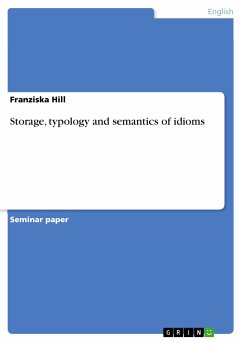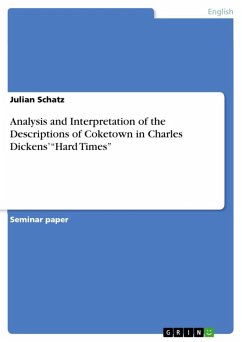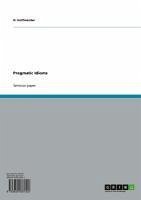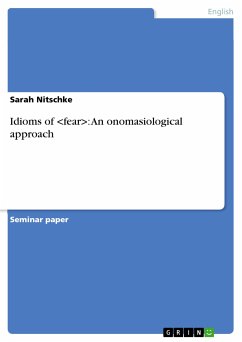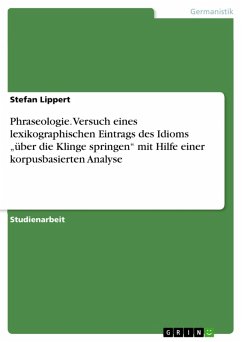Seminar paper from the year 2004 in the subject English Language and Literature Studies - Linguistics, grade: 2,0, University of Rostock, language: English, abstract: "Such expressions are termed idioms, defined as groups of words with set meanings that cannot be calculated by adding up the separate meanings of the parts" (Heidi Anders 1995, 17). Idioms have a semantic productivity which means 'die wendungsinternen Bedeutungen einzelner Idiom-Konstituenten werden beim Konstruieren der Äußerung produktiv eingesetzt' and a discourse productivity: the possibility to interpret the constituents of an idiom as autonomous, semantically ambivalent entities (Dobrovols'kij 1997, 22). An idiom can also be seen as a lexical unit, which formally consists of several words, but semantically be a whole and will be treated and saved like words. (Dobrovols'kij 1997, 51) There is a great variety within idioms of their degree of flexibility anyhow an idiom is a lexical unit. Everybody intuitively can realize an idiom as an idiom because of different characteristics, e.g. several combinations and different intension. All fixed word-complexes are reproducible. Idioms are an open class, in the core there are the more idiomaticised idioms and in the periphery they are less idiomatic. But if the hearer does not know an idiom, it is no idiom. Idioms differ in relation to proverbs mainly in semiotic-semantic parameters. Proverbs have a discursive autonomy and are quoted as 'texts', idioms instead are reproduced as lexical units. Another difference is that proverbs verbalize 'general truth' and fall back on shared knowledge of the people. An idiom comes into existence if one uses a phrase or sentence about a common situation or object in a figurative manner. The phrase has to be especially to the point, expressive or pictographic. This new expression will be consolidated and lexicalised and after that it will be taken into normal speech. Most idioms are stylistically neutral, but they can also be on a stylisticly lower or higher level. Archaic, literary, foreign and formal words belong to the higher level, whereas colloquial, jargon, slang and vulgar words belong to the lower level. Especially the lower level is highly idiomaticised. The usage of idioms plays a role in the social positioning of conversational partners and to consolidate a social hierarchy. An idiom is more informative than its simple lexical counterpart.
Dieser Download kann aus rechtlichen Gründen nur mit Rechnungsadresse in A, B, BG, CY, CZ, D, DK, EW, E, FIN, F, GR, HR, H, IRL, I, LT, L, LR, M, NL, PL, P, R, S, SLO, SK ausgeliefert werden.

